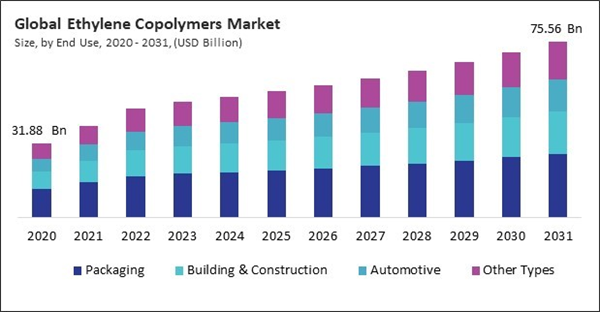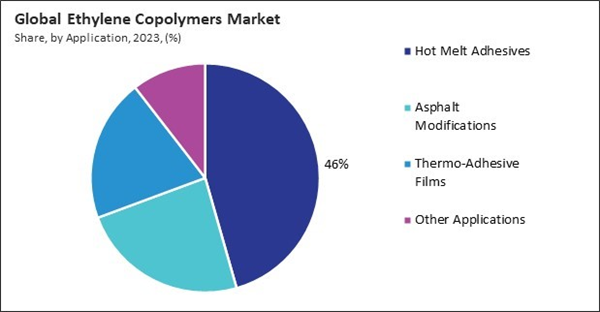North America’s growth is fueled by the strong adoption of ethylene copolymers in advanced packaging, automotive, and healthcare industries. The region's focus on sustainability and renewable energy applications, such as solar panel encapsulation, drives demand for high-performance materials. Hence, the North America segment acquired 27% revenue share in the market in 2023. In terms of volume, 8,994.3 kilo tonnes of Ethylene Copolymers are expected to be utilized by the year 2031. Additionally, investments in the construction sector and consumer preferences for eco-friendly and recyclable packaging further enhance the market’s prospects. North America's emphasis on technological innovation and infrastructure development solidifies its position as a significant contributor to the market.
The global focus on sustainable construction has also amplified the adoption of ethylene copolymers. These materials are compatible with eco-friendly practices, such as energy-efficient insulation systems and green building designs. Ethylene copolymers are used in photovoltaic encapsulants for solar panels, which are increasingly integrated into sustainable structures. Additionally, the construction and automotive industries also benefit from advancements in sustainable ethylene copolymers. In construction, these materials are used in green building solutions like energy-efficient insulation and moisture-resistant membranes, promoting eco-friendly practices. In the automotive sector, lightweight and recyclable ethylene copolymers are integrated into components to reduce vehicle emissions. Therefore, these developments will drive the expansion of the market.
However, the inconsistency in raw material prices creates additional challenges for businesses in downstream industries such as packaging, automotive, and construction. Companies relying on ethylene copolymers for their products must account for these unpredictable cost variations, which can lead to higher pricing for end-users or reduced demand. Thus, the fluctuating prices of petrochemical raw materials significantly hinder the growth and stability of the ethylene copolymers market.
Driving and Restraining Factors
Drivers- Increasing Demand from the Packaging Industry
- Expansion in Construction and Infrastructure Development
- Rising Consumer Awareness About Sustainability
- Fluctuating Raw Material Prices
- Increasing Global Focus on Environmental Sustainability
- Continuous Technological Innovations and Product Development
- Implementation of Supportive Government Regulations
- Government Regulations Aimed at Mitigating Environmental Degradation
- Increasing Competition from Alternative Materials
Application Outlook
Based on application, the market is classified into hot melt adhesives, asphalt modifications, thermo-adhesive films, and others. The hot melt adhesives segment garnered 46% revenue share in the market in 2023. In terms of volume, 16,641.8 kilo tonnes of ethylene copolymers are expected to be utilized in hot melt adhesives by the year 2031. The increasing demand for efficient, versatile, and rapid bonding solutions across packaging, woodworking, and automotive industries drives the hot melt adhesives segment. Ethylene copolymers are widely favored in this segment due to their excellent adhesion properties, flexibility, and ability to bond with various materials, including paper, plastics, and metals.End Use Outlook
On the basis of end use, the market is divided into packaging, building & construction, automotive, and others. The building and construction segment recorded 24% revenue share in the market in 2023. In terms of volume, 9,193.9 kilo tonnes of ethylene copolymers are expected to be utilized in building and construction by the year 2031. In this sector, the demand for ethylene copolymers is fueled by their superior performance in applications such as waterproofing membranes, adhesives, sealants, and thermal insulation. Their flexibility, chemical resistance, and ability to enhance durability and weatherproofing make them indispensable in modern construction projects.Type Outlook
By type, the market is segmented into ethylene vinyl acetate, ethylene ethyl acrylate, ethylene butyl acrylate, ethylene propylene, and others. The ethylene vinyl acetate segment witnessed 45% revenue share in the market in 2023. In terms of volume, 15,365.3 kilo tonnes of ethylene vinyl acetate is expected to be utilized by the year 2031. The ethylene vinyl acetate (EVA) segment is driven by its versatile applications in solar energy, footwear, packaging, and adhesives. EVA’s superior flexibility, impact resistance, and lightweight properties make it ideal for encapsulating solar panels and manufacturing durable consumer goods. The increasing demand for sustainable and energy-efficient solutions, coupled with its role in renewable energy systems, contributes significantly to the growth of the EVA segment.Regional Outlook
Region-wise, the market is analyzed across North America, Europe, Asia Pacific, and LAMEA. The Asia Pacific segment procured 43% revenue share in the market in 2023. In terms of volume, 18,354.3 kilo tonnes of ethylene copolymers are expected to be utilized in this region by the year 2031. The Asia Pacific segment is driven by rapid industrialization, urbanization, and infrastructure development in China, India, and Southeast Asia. The region's thriving packaging, automotive, and construction industries fuel demand for ethylene copolymers due to their flexibility, durability, and chemical resistance.List of Key Companies Profiled
- BASF SE
- The Dow Chemical Company
- DuPont de Nemours, Inc.
- Sumitomo Electric Industries, Ltd.
- Saudi Basic Industries Corporation (SABIC)
- Exxon Mobil Corporation
- Arkema S.A.
- Celanese Corporation
- LyondellBasell Industries Holdings B.V.
- INEOS Group Holdings S.A.
Market Report Segmentation
By Application (Volume, Kilo Tonnes, USD Billion, 2020-2031)- Hot Melt Adhesives
- Asphalt Modifications
- Thermo-Adhesive Films
- Other Applications
- Packaging
- Building & Construction
- Automotive
- Others
- Ethylene Vinyl Acetate
- Ethylene Ethyl Acrylate
- Ethylene Butyl Acrylate
- Ethylene Propylene
- Others
- North America
- US
- Canada
- Mexico
- Rest of North America
- Europe
- Germany
- UK
- France
- Russia
- Spain
- Italy
- Rest of Europe
- Asia Pacific
- China
- Japan
- India
- South Korea
- Australia
- Malaysia
- Rest of Asia Pacific
- LAMEA
- Brazil
- Argentina
- UAE
- Saudi Arabia
- South Africa
- Nigeria
- Rest of LAMEA
Table of Contents
Companies Mentioned
- BASF SE
- The Dow Chemical Company
- DuPont de Nemours, Inc.
- Sumitomo Electric Industries, Ltd.
- Saudi Basic Industries Corporation (SABIC)
- Exxon Mobil Corporation
- Arkema S.A.
- Celanese Corporation
- LyondellBasell Industries Holdings B.V.
- INEOS Group Holdings S.A.










